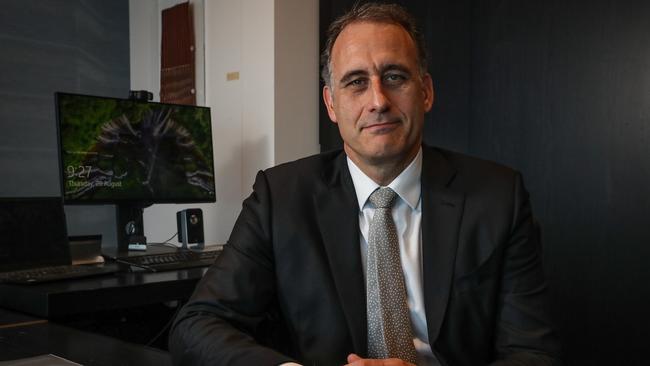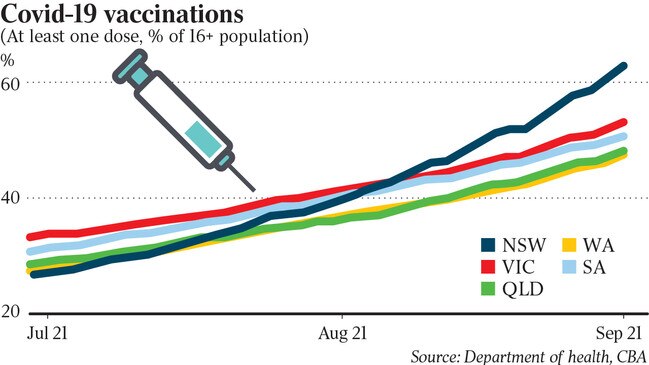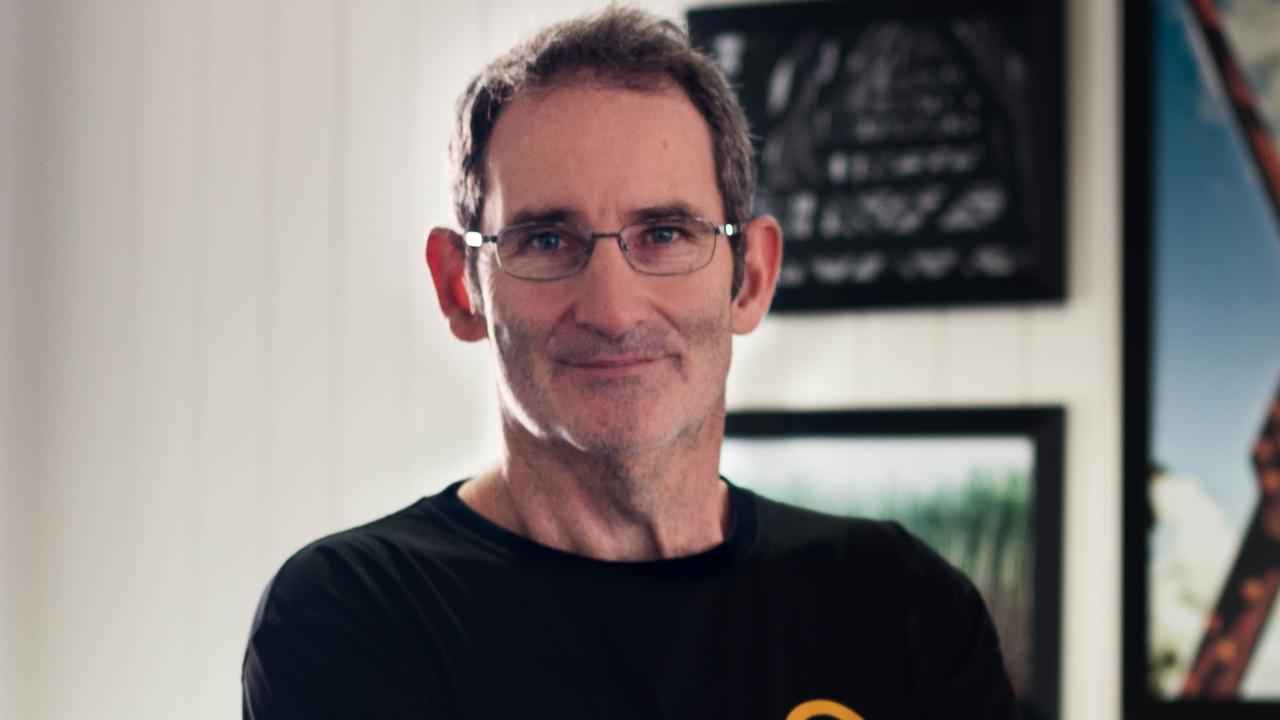Open up at 70pc – or risk a recession: corporate leaders call for releasing economy
Wesfarmers chief Rob Scott has led calls among senior corporate leaders to demand an opening of the economy once a 70 per cent vaccination threshold is hit.

Business
Don't miss out on the headlines from Business. Followed categories will be added to My News.
Wesfarmers chief executive Rob Scott has led calls among the nation’s most senior corporate leaders to demand an opening of the economy once a 70 per cent vaccination threshold is hit, in keeping with the national cabinet plan, as the social, economic and mental health costs of protracted lockdowns becomes crippling.
The push puts the Perth-based Mr Scott on course for a clash with WA premier Mark McGowan who late Friday said the state won’t be opening itself up to the rest of the country if WA is still Covid-19 free when it reaches the 70 per cent vaccination threshold.
Mr Scott, who leads a business that employs 100,000 workers of which 2500 are currently in enforced home isolation due to Covid-19 outbreaks, warned the next few months would get tougher and that we were approaching a situation where lockdowns were doing more harm than good.
And although he stopped short of asking for mandatory vaccinations, the Wesfarmers boss, whose businesses include hardware giant Bunnings, Officeworks and Kmart, said the government should consider greater freedoms for those who have been fully vaccinated to encourage others to get the jab.

Mr Scott has sounded one of the most stern warnings about the creeping impact of lockdowns and closed businesses on the economy and community at the tail end of reporting season, but is not alone in corporate Australia this month to sound the alarm bells.
“I think the next couple of months are going to be really tough, they are going to be tougher, because the longer we are in lockdown obviously the more the challenge it is, I think we are rapidly approaching the situation where the benefits of widespread, prolonged lockdowns don’t outweigh the negative consequences of lockdown,” Mr Scott told The Weekend Australian after Wesfarmers released its latest annual results.
“There is a serious social, economic and mental health impact from extended lockdowns and we are starting to see that. We need to overlay a much greater degree of empathy and compassion to our lockdown strategy because we are starting to see households doing it incredibly tough.”
He said he supported the plan set out by the national cabinet to begin opening up the economy when the country hits 70 per cent vaccination.
“We support the national plan, essentially, accelerate vaccinations, go as fast as we can with vaccinations then start opening once we get to 70 per cent and more broadly 80 per cent.
Mandatory vaccinations might not work for all businesses, including Wesfarmers, but Mr Scott believes that people who do get vaccinated should be able to enjoy more freedoms, and the government should consider this to encourage others.
“We are not looking at mandatory vaccination at the moment, over time I would expect the government would start to allow greater freedoms for people that have been vaccinated and I think that is important to further encourage people to get vaccinations. The risks to individuals and the community from people that have been vaccinated are so much lower, it makes sense that government does allow people who have been vaccinated to enjoy greater freedoms and we would certainly support that.’’
Mr Scott’s comments bookended similar views among senior executives through profit reporting season in recent weeks as corporate Australia grapples with vaccines, the cost of lockdowns and Covid impact on staff and customers.
Blackmores chief executive Alastair Symington said “freedom day” - an idea first raised by NAB boss Ross McEwan for flinging open the economy on Melbourne Cup day - was more likely to be after Christmas.
“Certainly, when we get above 80 per cent vaccination rate, we should be at a stage when we‘re starting to think about living with Covid-19 within the community,” he told The Weekend Australian.
“Whether that‘s taking restrictions off in your neighbourhood, state or international travel - I think it has got to be a staged approach. It has to start with making sure the worst affected LGAs are healthy and safe, and prioritising vaccines in those areas. Then it’s a matter of making sure we are all comfortable within our states that the vaccination rate is high enough that the community at large is protected.”
Mr Symington said it was one thing to open up a state, then open up the nation, given states and territories were operating at “different speeds”.
“As for borders opening up, it‘s a little more challenging because each state is going to go at a different speed and even if vaccination rates are 80 per cent it will depend on whether they’re comfortable opening their borders,” Mr Symington said.
“My prediction... is it will be more likely after Christmas when we see opening up.”
Amcor chief executive Ron Delia said his businesses in North America and Europe were seeing things functioning almost as they were as economies opened.
“Businesses are running, retail and restaurants are open and we really haven‘t seen snap lockdowns. Obviously in Australia you’re experiencing them, but in the rest of the world we’ve not seen that.
“Governments around the world are balancing all kinds of different considerations as they think about how to manage through this and it does seem like in Australia there is a slightly different objective to elsewhere. And as a result you are seeing those snap lockdowns which are frustrating obviously for the people there.”
Car dealer group Peter Warren Automotive has had its Sydney showrooms closed for every day of this financial year - but CEO Mark Weaver struck a different chord to other CEOs, saying he still backs lockdowns, despite the impact on business.
“Some of our businesses are right in the heart of these LGAs of concern in Sydney. So we see on a daily basis the impact Covid has when it rips through families,” he said.
“So despite the commercial impact, I am a fan of the lockdowns. I think they are doing what they need to do in restricting movement, and I think that’s important.“
Mr Warren said the company had been pushing staff to get vaccinated, with enthusiastic takeup.
“I also think the vaccination pathway is the right pathway and I am actually really delighted from a business operator perspective on how that is progressing,” he said.
“We track that as well, with our teams...we’re tracking just ahead of where NSW is as a state, so we’re supportive of this journey.”
Elsewhere, Santos CEO Kevin Gallagher called for a pathway for allowing double vaccinated people to travel across state borders. Bunnings has opened popup vaccination centres for staff and tradies at some of its stores.
Meanwhile, the cost to the economy, not to mention mental health, is now threatening to force Australia into a recession. It is starting to show up in national accounts. The Australian Bureau of Statistics said retail sales fell 2.7 per cent month-on-month in July, even weaker than a 2.5 per cent fall expected by economists.
Food retailing rose 2.3 per cent, but household goods retailing fell 2.2 per cent, clothing and footwear sales dived 15.4 per cent, department stores fell 11.4 per cent and cafes, restaurants and takeaway fell 12.3 per cent amid increasing Covid lockdowns in the month.
“The spread of community transmission of the Delta variant of Covid-19 is hurting retailers because of extended lockdowns,” said Citi chief economist, Josh Williamson.
“With lockdowns extending across August and September, we believe retail activity is unlikely to recover meaningfully until the fourth quarter.”
Citi‘s Mr Williamson cautioned that “less fiscal stimulus means that the bounce back may not be as large when the economy reopens”.
CBA‘s head of Australian economics, Gareth Aird, revised down his Australian economic growth forecasts to account for Victorian lockdowns.
Based on an assumption that Victoria remains in lockdown through September, he predicted the economy would contract 4.5 per cent in the September quarter versus 2.7 per cent previously forecast. This could throw Australia into a recession.
National Australia Bank senior economist Gareth Spence said he had pencilled in a 3 per cent fall in economic activity in the third quarter with a rebound in activity beginning in the fourth quarter. The stresses on households was the main culprit.
“The decline in activity will again come mainly from household consumption, though there may have also been some disruption to both dwelling and business investment in the quarter. Given the impact of prior lockdowns has been relatively temporary, the focus remains on how quickly the economy rebounds as the current restrictions are eased,” Mr Spence said.
Originally published as Open up at 70pc – or risk a recession: corporate leaders call for releasing economy



